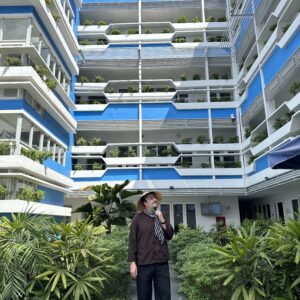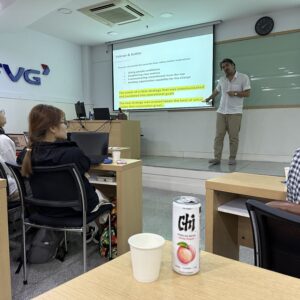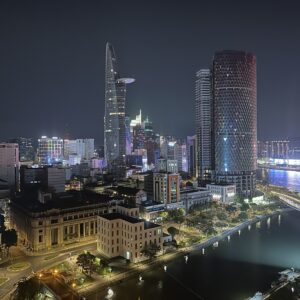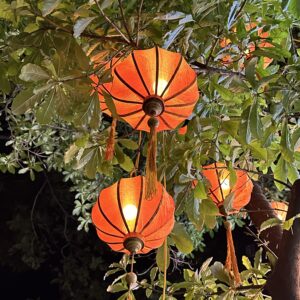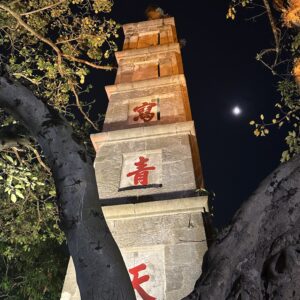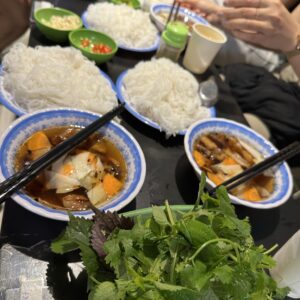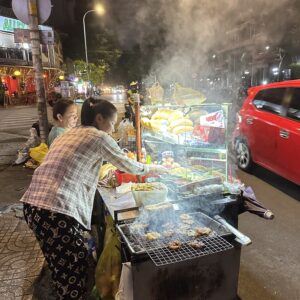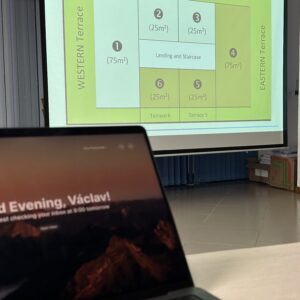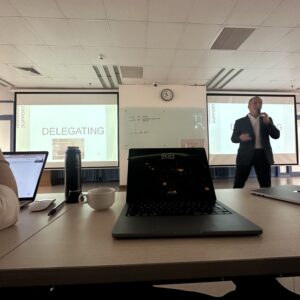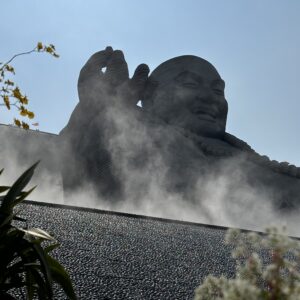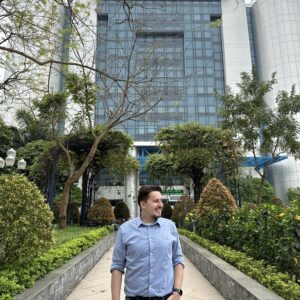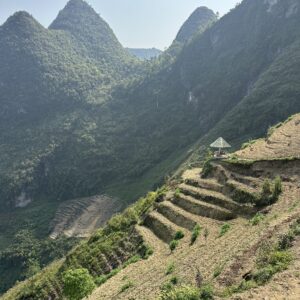Foreign study experience – Business and Beyond in Vietnam
Since the class of 2023, part of our curriculum has been a study abroad experience. Although Václav Kňourek is from an earlier cohort, he decided to take advantage of this opportunity and spend more than a month in Vietnam at our partner university. Here is his report.
Xin chào
As an extension of my Executive MBA programme at Prague University of Economics and Business (VSE), I was granted the opportunity to enhance my business knowledge at universities in Hanoi and Ho Chi Minh City, Vietnam. During this unforgettable experience, I took intensive modules, including Leadership, Corporate Social Responsibility & Sustainability Management, and a Brand Image workshop.
Cooperation with CFVG
This unique opportunity emerged from a recent partnership between my Executive MBA program at the Faculty of Business Administration at VSE Prague and the French–Vietnamese School of Management (CFVG). The CFVG’s MBA program brings together Vietnamese and French students from different age groups, creating a vibrant mix of cultural standpoints and business ideas. It’s crafted to empower future leaders from various backgrounds, providing them with the essential skills to thrive in the complex world of global business.
Two cities, two emotions: Living Vietnam’s contrasts
The CFVG is located in two of Vietnam’s major cities, providing contrasting yet linked experiences. With its rich history and traditional charm, Northern Hanoi introduced me to Vietnam’s heritage. Meanwhile, in the bustling southern metropolis of Ho Chi Minh City, I encountered the country’s rapid economic growth and vibrant business scene. Experiencing these two distinct urban environments broadened my understanding of Vietnam’s multifaceted identity.
As a curious student, I watched many documentaries about Vietnam’s past, covering roughly a century (I became genuinely interested). The most intriguing aspect was discussing my classmates’ perspectives and their understanding of the country history.
The study itself: Leadership & CSR in a dynamic context
Imagine a classroom full of Asian and European mindsets, thinking and discussing worldwide matters under the guidance of their professors. It was fascinating, and I gained a lot through participating in it.
The Leadership course challenged my views on effective leadership in a globalised context, highlighting the need for adaptability and cross-cultural communication. Given my professional focus on leadership and strategic management, it aligned perfectly with my interests.
The Corporate Social Responsibility & Sustainability Management course, with its incredible professor’s engaging approach, resonated with me because it highlighted the increasing importance of ethical and sustainable business practices, particularly relevant to emerging markets like Vietnam.
The Brand Image workshop provided essential tools and insights for developing and managing brands in a rapidly evolving consumer market environment.
Each module included meaningful projects, class preparation, case study readings, practical exercises, and collaborative problem-solving on various topics (e.g., water management, disaster risk management, cooperative strategy, and internalisation).
In preparing for my final thesis, I discussed the topic of Happiness Management with my classmates. While this concept isn’t as common in Vietnam’s business landscape as in the Western one, some underlying principles are recognised, including flexible motivation, relationship enhancement, and a positive work setting.
It most probably comes hand in hand with Vietnamese culture, which places a high value on maintaining harmonious relationships. The emphasis on respect and harmony in Vietnamese culture might lead to a more outwardly reserved yet loyal demeanour in the workplace.
Transformative Learning
It was indeed an honour to learn from esteemed professors from IAE Paris and IÉSEG School of Management.
Professor Philippe G. Bianchi brought over twenty years of international business experience, along with fourteen years of teaching and consulting expertise. His well-structured lectures included engaging team activities, negotiation exercises that encouraged stepping out of one’s comfort zone, and meaningful applications of leadership techniques in real-world contexts. I was particularly impressed by his thoughtful and prompt responses to student feedback.
Professor Rodrigo Kambayashi delivered one of the most captivating courses I have ever attended. His extensive knowledge of social innovation, ESG and CSR standards, along with his hands-on experience in transforming NGOs into social enterprises, offered a strong viewpoint. His global experience and bold, practical approach to CSR inspired me to delve deeper into the topic, leading me to pursue additional research. His ability to connect theory with real-world situations made a profound impact.
This experience expanded my understanding of diverse educational methodologies and offered invaluable insights into global business practices.
The education transcended classroom boundaries
On top of my academic responsibilities, I was fortunate to engage with local business owners and managers from both international and local companies. These connections provided valuable (practical) insights into the challenges and opportunities faced in the Southeast Asian market. Our discussions covered subjects about effective market research, supply chain management, navigating regulatory frameworks, and grasping consumer behaviour.
These firsthand perspectives significantly enhanced my understanding of the region’s distinctive business environment, particularly the rapid economic growth that positions Vietnam as one of Asia’s most dynamic emerging economies. Seeing “behind the scenes” how businesses adapt to this rapid change was genuinely incredible. For context, Vietnam’s GDP in 2022 reached US$409 billion with an 8% annual growth rate, making it the 35th largest economy globally.
I’ve come to understand the unique Vietnamese perspective on doing business. Establishing a personal connection and building trust are essential before moving forward to close the deal. Direct criticism is often avoided, with a strong focus on diplomacy. In other words, nurturing positive relationships and avoiding conflict are key factors.
Friends & Cultural insight: Connecting on a deeper level
I couldn’t be more grateful for the people I’ve met in the classroom. I had the chance to explore cities from a perspective that mirrors the life of a local. My fellow classmates offered priceless insights into Vietnamese culture, providing perspectives I wouldn’t have gained as a tourist. They assisted me in navigating local customs, discovering hidden gems, and genuinely experiencing the warmth and hospitality of the Vietnamese people. A personal takeaway: family plays a central role in Vietnamese life.
Having travelled in Asia before, I believed I was familiar with the region’s cuisine. Yet, Vietnam’s rich and varied culinary scene still surprised me. From street vendors to local restaurants, I explored a wide range of dishes, always impressed by the freshness of the ingredients and the creative use of flavours. I was particularly struck by the wasteless philosophy in food preparation (in contrast to the European one), which uses every part of the ingredient. While I eagerly tried many local specialities, I also appreciated having familiar dishes available when I wanted some “safe options.” I enjoy being adventurous, but raw octopus and offal are too much for me.
The greatest opportunity
As an extension to this extension, I took it even further. Once my exams were over, I travelled through Vietnam, Malaysia, South Korea, Japan, and Singapore for several months. By spending a few weeks in each country, I gained firsthand insights into various economies, business practices, innovative trends, technological advancements, and diverse cultural norms. It was certainly an unforgettable and worthwhile journey.
Equipped for the future
This comparative learning has inspired me to think more creatively and strategically while sharpening my skills as a more proficient problem solver.
I owe a special “Cảm ơn” to Vojtěch Opleštil and Ladislav Tyll at the Prague University of Economics and Business, for the opportunity. Studying the same fundamental business principles in a distinctly different context, witnessing how essential concepts are adapted and used in Vietnam, influenced by local conditions, and religious beliefs, has been a genuinely enlightening experience. It underscored the significance of contextual awareness and the necessity for adaptable strategies in our globalised society. Considering familiar topics from fresh perspectives has challenged my own assumptions and prompted a critical reassessment of my viewpoint, leading me to explore alternative methods.
An international adventure such as this one has, without a doubt, enriched both my professional and personal growth, equipping me with an open mindset and the cultural agility necessary to succeed in an increasingly interconnected world.
